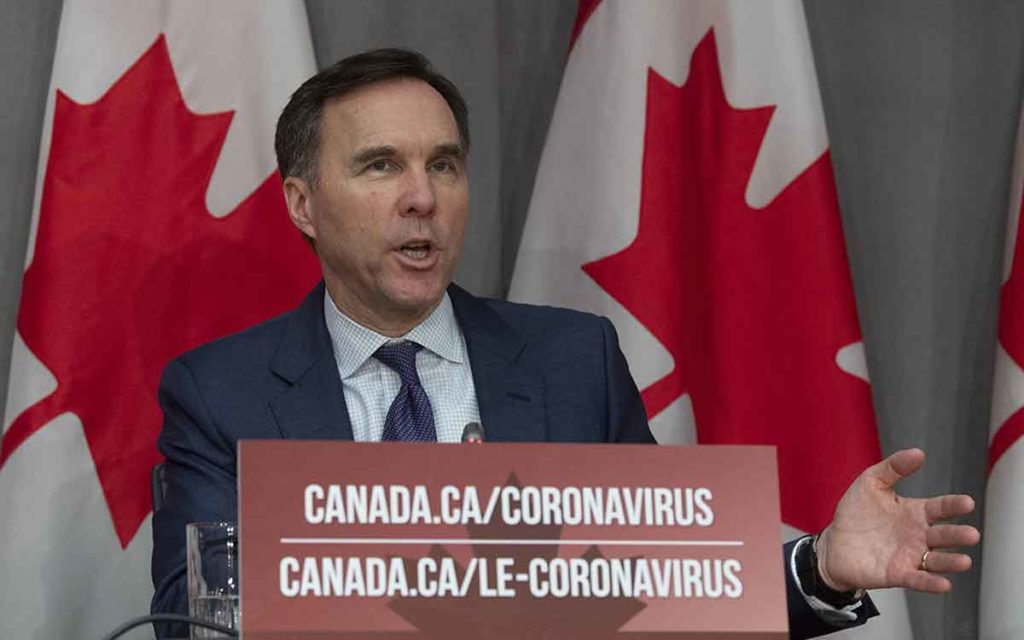
Minister of Finance Bill Morneau during a news conference in Ottawa, Friday, March 27, 2020. Photo: The Canadian Press/Adrian Wyld
The federal government has announced a flurry of government programs in the last two weeks, all designed to support Canadians and businesses during the COVID-19 storm. The intention to help is clear, but the hoops through which families, workers and business owners need to jump are anything but. The resulting confusion has seen businesses – from start-ups to restaurants – unable to get the financial assistance required to continue operating.
The Trudeau government’s latest attempt to help is the Canada Emergency Wage Subsidy (CEWS). The program is designed to incentivize employers to keep workers on payroll by offering to pay for 75% of their employees wages. The intention was to ease the burden on the already-strapped Employment Insurance system. Sadly, the eligibility criteria to access these funds will leave many small businesses out in the cold.
Applicants must first prove a drop in revenue of at least 30% in March 2020 compared to March 2019. While businesses with stable revenues and years of growth to compare against may be able to do this, startups or those without 2019 revenues to compare against, cannot. Applicants will also be punished for their success; you could have lost 70% of your revenue in the last two weeks, but if you had a great 2019 (and therefore, can’t prove an overall 30% drop), you won’t be able to access funding.
Understandably, Canada’s entrepreneurial and startup community is up in arms. Pre-COVID, governments at all levels bent over backwards to keep and retain tech talent in Canada, and encourage investments in the sector. Now, without stable revenues to point to, many of these new companies may be forced to either scale back or close entirely.
The entrepreneurial spirit of small business owners is also being challenged through ineligibility for federal loans. Most notably, bars, nightclubs and cannabis shops won’t qualify for loans offered by the Business Development Bank of Canada (BDC), as these “sin-dustries” violate “community standards of conduct and propriety”. Ironically, businesses must also be at least two years old to access federal loan support; a tall order given that cannabis has not even been legalized in Canada for 18 months.
Of course, loans are only good if you can pay the money back, which is simply not the case for many businesses. Canada’s restaurants and food service industry – which has already lost 800,000 jobs, or a whopping two thirds of their workforce – have rightly pointed out that these loans are ineffectual for their businesses. They, too, are calling for more flexible criteria and application of the wage subsidy program and grants to keep their businesses afloat.
The strict criteria for another federal program – Canada Emergency Response Benefit – may also leave out as much as a third of Canada’s unemployed persons. The program applies only to those who have been laid off (i.e. with no income) due to the COVID-crisis. If you still collect a paycheque – even if you’ve scaled back hours – you won’t qualify for this program. In some industries, that may well incentivize employees to stop working altogether as the $2000 / month credit may be more lucrative than continuing to work even at reduced hours. The program also leaves out anyone who earned less than $5,000 in 2019, adversely impacting many students who will also have difficulty obtaining employment this summer with the ongoing pandemic. The good news: Trudeau has admitted the program needs amendments to address students and precarious workers, so hope may be on the horizon for some.
Add to these complexities an already-stressed Employment Insurance regime which has struggled at the best of times, and you’ve got a recipe a frustrated business community that is already fighting for its life. A surge in applications for EI – over 1 million and counting – has resulted in unanswered phone calls to Service Canada, which closed their doors just when they are needed most.
Having recently gone through the EI process for my maternity leave, I can attest to the help and assurance speaking with someone over the phone about my application provided. How these government workers are not considered essential at a moment like this boggles the mind.
Canadians can perhaps take solace in the fact that no country seems to have a silver bullet for this economic crisis. But if the current suite of programs is already leaving many in the cold, maybe decisions on finances should be left directly to Canadians, rather than government bureaucrats. That appears to be the approach of our neighbours to the south; the United States has decided to offer stimulus cheques for all taxpayers. While it’s not without flaws, it does put the responsibility and control of fiscal management directly in the hands of people, rather than the government.
For now, it seems Canada’s government isn’t quite ready to trust Canadians to do the same.





















